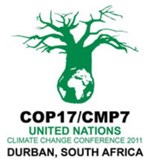
Top stories




Marketing & MediaWarner Bros. was “nice to have” but not at any price, says Netflix
Karabo Ledwaba 1 day


More news

Logistics & Transport
Maersk reroutes sailings around Africa amid Red Sea constraints

















After going into almost 24 hours of extra time, governments have decided to adopt a universal legal agreement on climate change no later than 2015.
The package of decisions known as the Durban Platform centred around adaptation, green climate fund, technology and strategies to support developing countries.
Work will begin on this immediately under a new group called the Ad Hoc Working Group on the Durban Platform for Enhanced Action.
"I salute the countries that made this agreement. They have all laid aside some cherished objectives of their own to meet a common purpose - a long-term solution to climate change," said Christiana Figueres, executive secretary of the United Nations Framework Convention on Climate Change (UNFCCC).
Figueres said this is highly significant because the Kyoto Protocol's accounting rules, mechanisms and markets all remain in action as effective tools to leverage global climate action and as models to inform future agreements.
A significantly advanced framework for the reporting of emission reductions for both developed and developing countries was also agreed, taking into consideration the common but differentiated responsibilities.
Governments also agreed on the full implementation of the package to support developing nations, agreed last year in Cancun, Mexico.
"This means that urgent support for the developing world, especially for the poorest and most vulnerable to adapt to climate change, will also be launched on time," said Figueres.
The package includes the Green Climate Fund, an Adaptation Committee designed to improve the coordination of adaptation actions on a global scale, and a Technology Mechanism, which are to become fully operational in 2012.
"While it is clear that these deadlines must be met, countries, citizens and businesses who have been behind the rising global wave of climate action can now push ahead confidently, knowing that Durban has lit up a broader highway to a low-emission, climate resilient future," said Figueres.
The COP18/CMP8, will take place on 26 November to 7 December 2012 in Qatar, in close cooperation with the Republic of Korea.
Details of key decisions that emerged from COP17 include:
Green Climate Fund - Countries have already started to pledge to contribute to start-up costs of the fund, meaning it can be made ready in 2012, and at the same time can help developing countries get ready to access the fund, boosting their efforts to establish their own clean energy futures and adapt to existing climate change.
Finance scheme - A focussed work programme on long-term finance was agreed, which will contribute to the scaling up of climate change finance going forward and will analyse options for the mobilisation of resources from a variety of sources.
Adaptation - The Adaptation Committee, composed of 16 members, will report to the COP on its efforts to improve the coordination of adaptation actions at a global scale.
National Adaptation Plans - The adaptive capacities above all of the poorest and most vulnerable countries are to be strengthened. National Adaptation Plans will allow developing countries to assess and reduce their vulnerability to climate change.
The most vulnerable are to receive better protection against loss and damage caused by extreme weather events related to climate change.
Technology - The Technology Mechanism will become fully operational in 2012. The full terms of reference for the operational arm of the Mechanism - the Climate Technology Centre and Network - are agreed, along with a clear procedure to select the host. The UNFCCC secretariat will issue a call for proposals for hosts on 16 January 2012.
Support of developing country action - Governments agreed a registry to record developing country mitigation actions that seek financial support and to match these with support. The registry will be a flexible, dynamic, web-based platform.
• A forum and work programme on unintended consequences of climate change actions and policies were established.
• Under the Kyoto Protocol's Clean Development Mechanism, governments adopted procedures to allow carbon-capture and storage projects. These guidelines will be reviewed every five years to ensure environmental integrity.
• Governments agreed to develop a new market-based mechanism to assist developed countries in meeting part of their targets or commitments under the Convention. Details of this will be taken forward in 2012.
SAnews.gov.za is a South African government news service, published by the Government Communication and Information System (GCIS). SAnews.gov.za (formerly BuaNews) was established to provide quick and easy access to articles and feature stories aimed at keeping the public informed about the implementation of government mandates.
Go to: http://www.sanews.gov.za